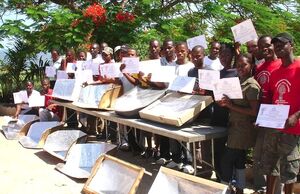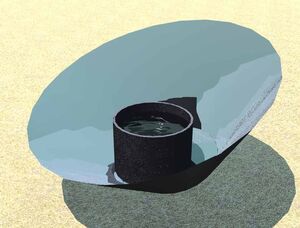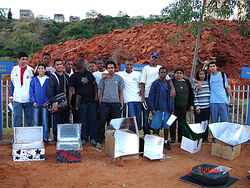Paul Hedrick (talk | contribs) |
Paul Hedrick (talk | contribs) |
||
| Line 3: | Line 3: | ||
See [[Calendar of events]] |
See [[Calendar of events]] |
||
==Recent News and Developments== |
==Recent News and Developments== |
||
| + | *'''July 2010:''' Solar Cookers for Africa: Solar Caravan 2010 - [[SunFire]] is a NGO in [[South Africa]] that has partnered with [[Solar Cookers for Africa]] to create the Caravan as a way to reach the portions of the population that live in areas typically difficult to reach. It will be a convoy of knowledge, experience, and partnerships in the area of sustainable household and community technologies and practices. The Caravan will start in [[Mozambique]], to eventually cover most of Southern Africa. Far from relying in the knowledge and resources of a few, the Caravan will link experts, product suppliers, communities and funders. Starting in August 2010, a core team of 4 people from 3 countries will start traveling from Johannesburg, South Africa, towards Beira, Mozambique. In each community the Caravan visits, its members will be presented with a flexible curriculum of applied introductory workshops and demonstrations about the core topics and technologies. One fixed workshop module concerns clean energy; another food security, waste management and nutrition. Visit their website at [http://solarcookersforafrica.com/ Solar Cookers for Africa] to learn more, see how your experience may be of value, and offer to financial support. |
||
[[File:SolarCycle1.jpg|300px|right]] |
[[File:SolarCycle1.jpg|300px|right]] |
||
*'''July 2009:''' John Tillman and Drew Durbin, both recent graduates of Brown University, learned about solar cookers while building and testing biogas stoves in Tanzania. They were inspired, and in 2008 formed [[SolarCycle]], an organization that develops low-cost solar cookers and water pasteurizers that reduce environmental damage and health problems associated with cooking smoke and contaminated drinking water. According to SolarCycle, Tillman and Durbin designed a “revolutionary material” consisting of three layers: a substrate of fused recycled plastic grocery bags, a reflective layer of postindustrial metalized packaging film, and a transparent protective layer. The material can be used to build durable, inexpensive solar cookers and pasteurizers that “turn an urban trash problem into a potential solution for diarrheal illnesses and respiratory diseases.” SolarCycle’s cooker is stamped out of a sheet of SolarCycle reflective material and assembled into the shape of an inverted cone with a flat bottom. The cone is 3 feet in diameter at the top, 9 inches in diameter at the bottom, and stands two feet tall, while the sides are angled 30 degrees from vertical. The cooker is expected to cost about $5. The SolarCycle team has entered social entrepreneurship business plan competitions at numerous universities and has been extremely successful, winning first prize at Rice, Colorado State University, Georgetown, and the University of Wisconsin, as well as beating out over 1,000 entries for the Chartered Insurance Institute’s “Big Idea” competition. [[Image:Mozambique_Association_for_Urban_Development_March_2007.jpg|left|250px]] SolarCycle’s winnings — in excess of $70,000 — have enabled it to open an office and purchase industrial machinery. SolarCycle is currently field testing its solar cookers and methods in Pemba, Mozambique. |
*'''July 2009:''' John Tillman and Drew Durbin, both recent graduates of Brown University, learned about solar cookers while building and testing biogas stoves in Tanzania. They were inspired, and in 2008 formed [[SolarCycle]], an organization that develops low-cost solar cookers and water pasteurizers that reduce environmental damage and health problems associated with cooking smoke and contaminated drinking water. According to SolarCycle, Tillman and Durbin designed a “revolutionary material” consisting of three layers: a substrate of fused recycled plastic grocery bags, a reflective layer of postindustrial metalized packaging film, and a transparent protective layer. The material can be used to build durable, inexpensive solar cookers and pasteurizers that “turn an urban trash problem into a potential solution for diarrheal illnesses and respiratory diseases.” SolarCycle’s cooker is stamped out of a sheet of SolarCycle reflective material and assembled into the shape of an inverted cone with a flat bottom. The cone is 3 feet in diameter at the top, 9 inches in diameter at the bottom, and stands two feet tall, while the sides are angled 30 degrees from vertical. The cooker is expected to cost about $5. The SolarCycle team has entered social entrepreneurship business plan competitions at numerous universities and has been extremely successful, winning first prize at Rice, Colorado State University, Georgetown, and the University of Wisconsin, as well as beating out over 1,000 entries for the Chartered Insurance Institute’s “Big Idea” competition. [[Image:Mozambique_Association_for_Urban_Development_March_2007.jpg|left|250px]] SolarCycle’s winnings — in excess of $70,000 — have enabled it to open an office and purchase industrial machinery. SolarCycle is currently field testing its solar cookers and methods in Pemba, Mozambique. |
||
Revision as of 19:19, 26 July 2010
Events
Recent News and Developments
- July 2010: Solar Cookers for Africa: Solar Caravan 2010 - SunFire is a NGO in South Africa that has partnered with Solar Cookers for Africa to create the Caravan as a way to reach the portions of the population that live in areas typically difficult to reach. It will be a convoy of knowledge, experience, and partnerships in the area of sustainable household and community technologies and practices. The Caravan will start in Mozambique, to eventually cover most of Southern Africa. Far from relying in the knowledge and resources of a few, the Caravan will link experts, product suppliers, communities and funders. Starting in August 2010, a core team of 4 people from 3 countries will start traveling from Johannesburg, South Africa, towards Beira, Mozambique. In each community the Caravan visits, its members will be presented with a flexible curriculum of applied introductory workshops and demonstrations about the core topics and technologies. One fixed workshop module concerns clean energy; another food security, waste management and nutrition. Visit their website at Solar Cookers for Africa to learn more, see how your experience may be of value, and offer to financial support.
- July 2009: John Tillman and Drew Durbin, both recent graduates of Brown University, learned about solar cookers while building and testing biogas stoves in Tanzania. They were inspired, and in 2008 formed SolarCycle, an organization that develops low-cost solar cookers and water pasteurizers that reduce environmental damage and health problems associated with cooking smoke and contaminated drinking water. According to SolarCycle, Tillman and Durbin designed a “revolutionary material” consisting of three layers: a substrate of fused recycled plastic grocery bags, a reflective layer of postindustrial metalized packaging film, and a transparent protective layer. The material can be used to build durable, inexpensive solar cookers and pasteurizers that “turn an urban trash problem into a potential solution for diarrheal illnesses and respiratory diseases.” SolarCycle’s cooker is stamped out of a sheet of SolarCycle reflective material and assembled into the shape of an inverted cone with a flat bottom. The cone is 3 feet in diameter at the top, 9 inches in diameter at the bottom, and stands two feet tall, while the sides are angled 30 degrees from vertical. The cooker is expected to cost about $5. The SolarCycle team has entered social entrepreneurship business plan competitions at numerous universities and has been extremely successful, winning first prize at Rice, Colorado State University, Georgetown, and the University of Wisconsin, as well as beating out over 1,000 entries for the Chartered Insurance Institute’s “Big Idea” competition. SolarCycle’s winnings — in excess of $70,000 — have enabled it to open an office and purchase industrial machinery. SolarCycle is currently field testing its solar cookers and methods in Pemba, Mozambique.

Maputo solar cooking participants
- March 2009: Mozambique Association for Urban Development (AMDU) conducted a number of solar cooking courses and exhibits over the past several months, according to reports from AMDU President Maria dos Anjos Rosario and Dutch volunteer Anneke Hudig. Among its many accomplishments, AMDU conducted a series of three-week solar cooker construction and training courses in Maputo for 50 impoverished youth. These courses coincided with public solar cooking exhibitions, and were covered by local television media. A series of public demonstrations in Maputo drew large crowds, witnessing dozens of different solar cookers on display. At the 5th Mozambican Exhibition of Science and Technology, AMDU presented a 10-day workshop that taught youth how to make solar cookers out of recycled materials and how those cookers can efficiently use solar energy to cook food. More recently, AMDU has introduced an alternative energy program in three neighborhoods of Mocuba and 10 rural villages in the province of Zambezia. An early component of these programs was a solar cooker competition involving 40 participants from the various program areas. Solar cooking confidence was apparent among the contestants. The AMDU resource center in Hulene suburb of Maputo has been converted into an alternative energy center where youth can learn, experiment, and teach others about solar energy and recycling programs.
- April 2007: Maria dos Anjos Rosario taught a solar cooking class to 11th and 12th grade students at the Secondary School of the Superior Institute of Science and Technology. The class included discussion of how solar cookers work, construction of several models of solar cookers, solar cooking practice, analysis of the activities, and discussion of how to spread solar cooking. Rosario is president of the Mozambique Association for Urban Development, which promotes solar cookers, heat-retention cookers, and paper briquettes - a firewood and charcoal substitute. Contact: Maria dos Anos Rosario
The History of Solar Cooking in Mozambique
Little is known of solar cooking activities in Mozambique, other than the efforts of a faculty member at Eduardo Mondlane University, who had taught an American volunteer about the technology. The volunteer, Miho Kobashi then spent six months in a remote village, working as a teacher, and while there taught a number of villagers to make and use solar cookers. This small experiment used the CooKit that people made for themselves. As is usual, villagers were unwilling to believe that food could be cooked with a piece of cardboard, and were amazed to see the results of their experiment. (Solar Cooker Review, July 2003)
[Information for this section was taken originally from State of the Art of Solar Cooking by Dr. Barbara Knudson]
Climate, Culture, and Special Considerations
Solar Cookers International has rated Mozambique as the #16 country in the world in terms of solar cooking potential (See: The 25 countries with the most solar cooking potential). The estimated number of people in Mozambique with fuel scarcity but ample sun in 2020 is 3,800,000.
See also
- Discussion of southern Africa's suitability for solar cooking
- Solar cooker dissemination and cultural variables
Resources
Possible funders for solar cooking projects in Mozambique
Reports
Articles in the media
Web pages
Contacts
The entities listed below are either based in Mozambique, or have established solar cooking projects there:
SCI Associates
- Main article: Solar Cookers International Association
NGOs
Manufacturers and vendors
Individuals
Government agencies
Educational institutions
See also
References


